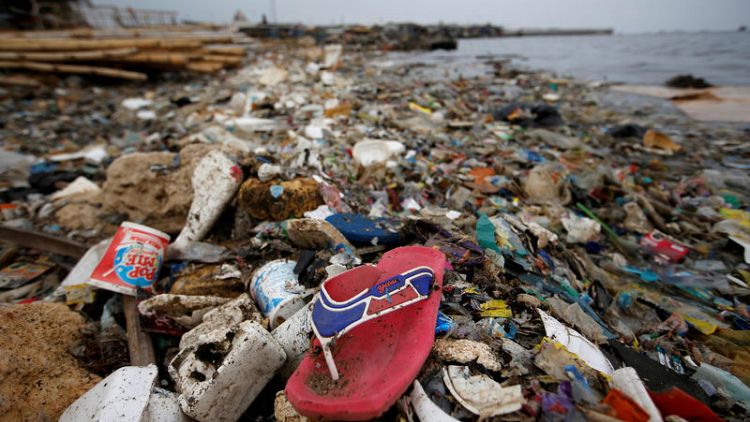By Gayatri Suroyo and Cindy Silviana
JAKARTA (Reuters) - As Indonesia struggles with mountains of plastic waste going into landfill and polluting its rivers and oceans, business groups are pushing to overturn restrictions on importing plastic scrap into Southeast Asia's biggest economy.
Indonesia, an archipelago of more than 17,000 islands, is estimated to be the world's second-largest contributor of plastic pollutants in the oceans after China, according to a 2015 study published in Science journal.
To tackle this, the government last year pledged up to $1 billion (789.76 million pounds) a year to reduce marine plastic debris by 70 percent by 2025.
But emerging divisions in the government on the issue of waste pose a fresh challenge to these targets. Partly driving this rift is a push by the plastics industry to overturn a halt in scrap imports, which was introduced in June on concerns about a flood of waste from western countries arriving after China barred such imports.
Industry minister Airlangga Hartarto last month sent a letter urging the environment ministry to lift its bar on imports because Indonesia does not currently produce enough suitable plastic waste to feed its recycling industry.
In the letter, reviewed by Reuters, Hartarto argued Indonesia needs 600,000 tonnes of imported scrap a year, much bigger than its usual 110,000 tonnes. He said the country enjoyed about a $40 million trade surplus by exporting recycled plastics.
"This is a potential industry that creates a lot of jobs," said Taufiek Bawazier, director of downstream chemical industry at the industry ministry, cautioning that focussing only on the environmental risks could harm the industry.
"WE MUST NOT HATE PLASTIC"
According to the 2015 Science journal report, almost half of the 3.2 million tonnes of plastic waste Indonesia produces in a year ends up in the sea.
The issue was graphically highlighted in November when a sperm whale was found dead with 6 kg of plastic waste in its stomach on an Indonesian beach.
But the government's waste reduction targets are complicated by a lack of recycling culture or awareness of environmental damage in the developing country of 260 million people.
Poor waste management means plastic trash that goes to landfills is too dirty to feed Indonesia's recycling industry, Bawazier said, adding that business would take more than the annual 1.1 million tonnes of local scrap if it was available.
Plastics lobby groups say downstream to upstream plastic industries employ 130,000 directly, while millions make a livelihood by scavenging for waste like plastic bottles for a small bit of cash.
"We must not hate plastic," said Christine Halim, chairwoman of Indonesia's recycling association, noting that buying foreign scrap was much cheaper than making products with virgin plastic and, as long as the environment was protected, should be seen as a business opportunity.
Safri Burhanuddin, deputy Coordinating Minister of Maritime Affairs, which overseas the environment ministry, said there were no plans to reopen scrap imports.
Nonetheless, the industry ministry argues there is no legal basis to stop imports, while the plastic industry has successfully lobbied policymakers before.
A 2016 plan to slap excise on all plastic packaging was watered down to only apply to plastic bags and even this has not been implemented yet.
The industry is currently also fighting a ban on plastic bags in supermarkets by some city governments. The Indonesia Olefin, Aromatic and Plastic Industry Association was cited in media saying the move had led to an oversupply of bags.
Burhanuddin of the maritime affairs ministry, however, applauded local action on waste management, pledging to award the best regional performers and shame laggards on social media.
Tiza Mafira, director of the Indonesia Plastic Bags Diet Movement, a group pushing to cut use of plastic, said it was a "ridiculous idea" to import waste.
"It is proven that we cannot handle plastic trash. It will end up in the landfill," she said.
(Additional reporting by Tabita Diela, Maikel Jefriando and Jessica Damiana; Editing by Ed Davies and Sam Holmes)


